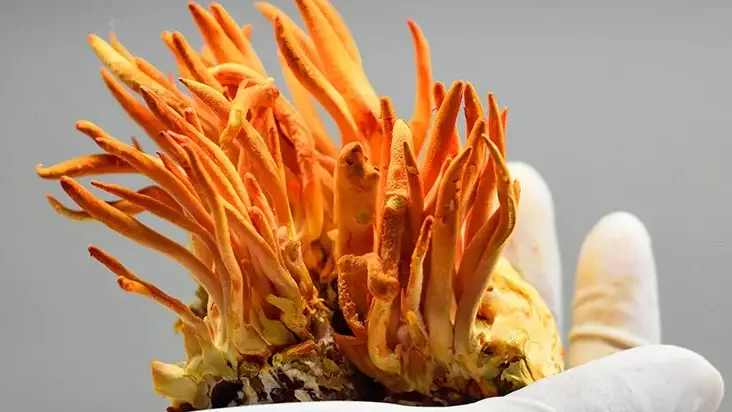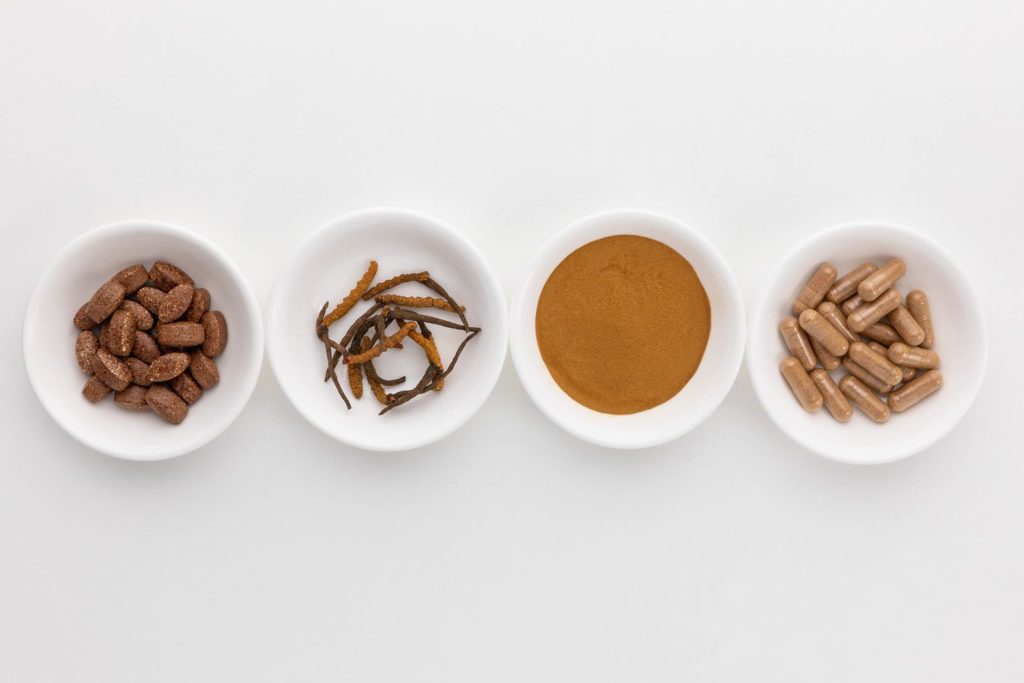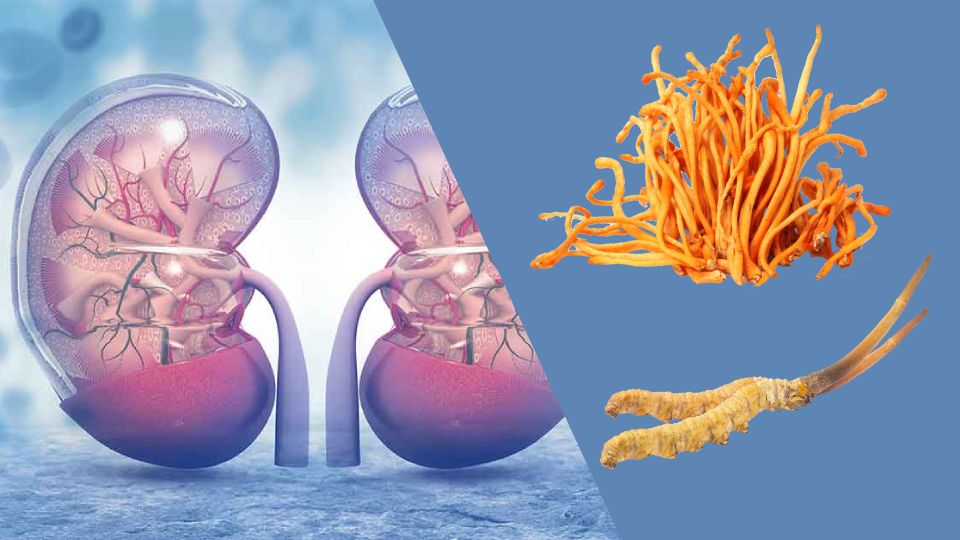Cordyceps for Kidneys – All You Need to Know
Cordyceps mushrooms, such as Cordyceps Sinensis and Militaris, offer a wealth of benefits for kidney health. They have been used in Traditional Chinese Medicine for centuries and have shown potential in improving chronic renal disease.
Recent studies indicate that Cordyceps extracts can effectively reduce renal fibrosis, improving kidney function. Cordyceps militaris, in particular, show promise in regulating protein, BUN, and creatinine levels in the bloodstream, benefiting individuals with kidney disease. Additionally, it exhibits protective properties against diabetic nephropathy, a common complication of diabetes.
This article comprehensively covers the use of Cordyceps for kidneys, offering a holistic approach to kidney nurturing.
In this article:
Understanding Kidney Disease
Before we delve into the benefits of Cordyceps, it is crucial to understand the implications of kidney disease. Kidney disease, also known as renal disease, refers to the impairment of kidney function, resulting in the accumulation of toxins and waste products in the body. This condition can have far-reaching consequences on an individual’s overall health.
Can Cordyceps Help Chronic Kidney Disease?
Cordyceps supplementation shows promise in benefiting individuals with chronic kidney disease. It can enhance kidney function, reduce proteinuria, and slow disease progression[1].
For those who have undergone kidney transplants but still experience kidney problems, Cordyceps has been found to enhance creatinine clearance, indicating its potential to boost kidney function and aid in waste product elimination from the body[2].
A three-month study focusing on Cordyceps militaris revealed its ability to reduce protein levels in urine, as well as blood urea nitrogen (BUN) and creatinine levels, effectively alleviating proteinuria and enhancing kidney health in individuals with chronic kidney disease[3].
Additionally, Cordyceps has shown favorable effects on lipid profiles by lowering triglyceride levels, total cholesterol levels, and bad cholesterol levels. Moreover, Cordyceps supplementation increases nitric oxide levels and boosts the activity of superoxide dismutase, an important antioxidant enzyme, contributing to overall kidney health improvement.[4].
It is important to clarify that there is currently no evidence suggesting that Cordyceps can reduce the risk of developing kidney disease. However, its use in individuals with existing kidney disease holds promise in terms of improving kidney function, reducing proteinuria, and slowing disease progression.
Scientific Studies
Cordyceps for kidneys works its beneficial effects through various mechanisms. Studies have revealed that it affects the TLR4/NF-κB redox signaling pathway, leading to improved kidney function. Additionally, Cordyceps has shown antioxidant effects and enhances the production of nitric oxide, a vital compound for blood vessel health. These multifaceted mechanisms contribute to the overall therapeutic potential of Cordyceps for kidney health[5].
Cordyceps Sinensis for Diabetic Kidney Disease

Diabetic kidney disease (DKD) is a major cause of end-stage renal failure (ESRF) in chronic kidney disease (CKD), leading to high mortality worldwide. Current DKD treatments primarily focus on controlling hyperglycemia, proteinuria, and hypertension, but they fall short of effectively slowing DKD progression.
Cordyceps sinensis, a precious Chinese herb, has been traditionally used. Its extracts offer nephroprotection, hepatoprotection, neuroprotection, and defense against ischemia/reperfusion-induced injuries. They also possess anti-inflammatory and antioxidant properties.
In traditional Chinese medicine, Cordyceps sinensis is believed to strengthen the lungs and kidneys. Several Chinese patent medicines made from Cordyceps sinensis are commonly used to treat DKD and have shown significant effectiveness.
Cordyceps Fights Conditions That Increase the Risk of Kidney Disease
Apart from its direct benefits on kidney health, Cordyceps also addresses several conditions that can elevate the risk of kidney disease. For instance, it aids in regulating blood pressure levels and preventing hypertension-induced kidney damage. Cordyceps also exhibits hypoglycemic properties, which can help manage diabetes—a condition known to contribute to kidney disease.
Should I Choose Cordyceps Sinensis or Cordyceps Militaris for Kidney Disease?
Cordyceps sinensis, known as caterpillar fungus, is an ancient Chinese medicine widely used to treat chronic kidney disease and aid post-kidney transplant recovery. However, Cordyceps militaris has been substituted in over 400 dietary supplements due to availability and heavy metal contamination issues.
Thailand Case Study: We present the first case series highlighting nephrotoxicity associated with C. militaris supplements. Eleven patients, mainly elderly and five with chronic kidney disease stages 3 to 5, suffered acute kidney injury (AKI) linked to these supplements, primarily containing cordycepin. Two of them required dialysis.
The causality of C. militaris-related AKI was assessed using the modified Naranjo algorithm, suggesting a probable relationship (scores ranging from 6 to 8). Nephrotoxicity from C. militaris may result from cyclooxygenase-2 inhibition and direct kidney tubule toxicity.
Other Benefits of Cordyceps

Cordyceps Sinensis Benefits
Cordyceps Sinensis possesses anti-inflammatory properties, enhances liver function, and boosts the immune system. Furthermore, Cordyceps Sinensis has shown promising effects on kidney health, making it a valuable ally in combating kidney disease.
Let’s delve deeper into its benefits with the table below:
| Medical Properties | Benefits |
| Boosts Exercise Performance | – Enhances exercise performance by increasing ATP production, providing cells with more energy[6]. |
| Anti-Aging Properties | – Protects against oxidative damage, helping to counteract signs of aging. |
| Potential Anti-Tumor Effects | – Exhibits potential anti-tumor and anti-cancer properties, aiding in fighting cancer cells and potentially reducing tumor size. |
| Helps Manage Type 2 Diabetes | – Assists in managing type 2 diabetes by lowering blood sugar levels and improving insulin sensitivity[7]. |
| Possible Immune-Boosting Effects | – Stimulates the immune system by increasing the production of immune cells and chemicals, potentially enhancing immune function. |
| Anti-Fatigue Properties | – Reduces fatigue and boosts energy levels, promoting improved stamina and vitality[8]. |
It is important to note that much of the research on Cordyceps Sinensis is based on animal or lab studies. Therefore, more research is required to determine its specific effects on humans. If you are considering taking supplements containing Cordyceps Sinensis, it is advisable to consult with a healthcare professional to ensure it is suitable for you.
Cordyceps Militaris Benefits

Cordyceps Militaris, another species of Cordyceps, shares similar benefits with Cordyceps Sinensis. Let’s explore how it may positively impact your well-being:
1. Anti-Inflammatory Properties
Cordyceps offers promising benefits for kidney health by actively reducing inflammation and promoting a stronger immune system. Inflammation plays a significant role in various kidney diseases but cordyceps actively combat it. Research studies in 2015 and 2018 concluded that chronic kidney disease (CKD) involves persistent low-grade inflammation, contributing to protein-energy wasting and increased mortality.
When exposed to cordyceps mushrooms, our body cells suppress specific inflammatory proteins, effectively minimizing inflammation triggered by harmful compounds. Cordyceps makes treating CKD easier for those already diagnosed and even reduces the risk of developing the disease in individuals without CKD. Consulting a healthcare professional can provide personalized advice on cordyceps supplementation for kidney health[9].
2. Improve Blood Pressure
Did you know that nearly half of adults in the United States (47%) have high blood pressure, according to the CDC? This means around 116 million people are at risk for Chronic Kidney Disease. High blood pressure can harm your kidneys by narrowing and weakening blood vessels, reducing blood flow, and hindering waste removal.
The good news is that cordyceps can help! Multiple research studies have confirmed the benefits of cordyceps for high blood pressure. A 2016 study found that cordyceps compounds have the potential to treat hypertension effectively. By addressing high blood pressure, cordyceps not only reduces the risk of kidney disease but also prevents its progression in those already affected[10].
3. Fights Diabetes
Over 34.2 million Americans have diabetes, and 1 in 3 adults with diabetes also have chronic kidney disease. Cordyceps, a remarkable mushroom, has shown great potential in managing diabetes effectively.
In studies, cordyceps reduced blood sugar levels, promoted glucose metabolism, and improved insulin sensitivity. It also helped suppress triglyceride and cholesterol levels while enhancing liver and kidney functionality[11].
4. Immune-Boosting Effects
Along with its benefits for managing diabetes, cordyceps has shown immune-boosting effects that can contribute to overall wellness.
Studies have indicated that cordyceps can enhance the function of the immune system, helping your body fight off infections and illnesses more effectively. By supporting your immune system, cordyceps may help you stay healthier and ward off common ailments.
5. Brain Function and Sex Drive
In regulating our sex drive, our brains play a crucial role through intricate chemical and neural interactions. The hypothalamus, a key player, controls bodily functions and releases hormones like testosterone and estrogen that fuel our desires. Neurotransmitters such as dopamine, serotonin, and oxytocin contribute to sexual pleasure. Factors like genetics, upbringing, and stress levels influence our brain’s response to sexual cues, resulting in a unique experience for each individual.
Studies suggest that Cordyceps mushrooms can increase testosterone levels in animals. Cordyceps supplementation directly enhances serum luteinizing hormone (LH) and testosterone levels, improving sperm count and motility. However, the effects of Cordyceps on estrogen levels in humans require further study. Consult healthcare professionals and stay informed about research to understand Cordyceps’ specific impacts on estrogen levels[12].
How to Incorporating Cordyceps in Your Daily Life
Here are a few ways:
- Start with Cordyceps Supplements: Selecting the right cordyceps supplements is essential. Always follow the manufacturer’s recommended dosage, or seek personalized guidance from a healthcare professional.
- Smoothies and Juices: Add Cordyceps extract powder to your favorite smoothies or juices. It blends well with fruits, vegetables, and other ingredients, enhancing both flavor and nutritional value.
- Coffee: Stir Cordyceps extract powder into your morning coffee for an energizing boost. It can provide a natural alternative to conventional energy-boosting additives.
- Culinary Delights: Experiment with incorporating Cordyceps into your cooking. It can be added to soups, stews, stir-fries, or even used as a seasoning for added depth and nutritional benefits.
- Cordyceps Infused Beverages: Prepare Cordyceps-infused beverages by steeping Cordyceps mushrooms in hot water. This creates a nourishing tea that can be enjoyed throughout the day.
- Snacks and Desserts: Get creative and include Cordyceps in your snacks and desserts. It can be blended into energy bars, mixed with nut butter, or sprinkled over yogurt or oatmeal.
Remember, it’s always advisable to consult with a healthcare professional or herbalist before incorporating any new supplement into your routine, especially if you have existing health conditions or take medications.
Dosage and Safety

Determining the appropriate dosage of Cordyceps for kidney disease requires individualized consideration. Studies have employed varying dosages ranging from 1.5 grams to 12 grams per day. The severity of the kidney disease and concurrent medications play a vital role in determining the optimal dosage. It is crucial to consult with a healthcare professional before commencing Cordyceps supplementation to ensure safety and efficacy.
Although Cordyceps is generally well-tolerated, potential side effects and interactions with other medications are not extensively documented, reinforcing the importance of professional guidance.
FAQs
Is Cordyceps Good for Kidneys?
Cordyceps may have potential kidney-protective properties, as some studies suggest it could help manage kidney-related issues. However, it’s crucial to consult a healthcare professional before using Cordyceps for kidney health, especially if you have kidney problems or are taking medications, as individual responses can vary.
Is Cordyceps Sinensis Bad for the Kidneys?
The search results indicate that cordyceps sinensis is not bad for the kidneys. It potentially exerts beneficial effects on kidney function and actively shields the kidneys from the harmful impact of toxic drugs, complications associated with diabetes, and rejection in transplant situations.
What is the Best Herb for Kidney?
The best herb for kidneys is “Chanca Piedra”. It has been traditionally used for kidney support and is believed to promote kidney health. However, consult a healthcare professional before use. “Prioritize your well-being and seek expert advice.
What is the Best Medicinal Mushroom for Kidney Disease?
The best medicinal mushroom for kidney disease is “Reishi mushroom(Ganoderma lucidum)”. It is often recommended for kidney health due to its potential to support kidney function and reduce inflammation. However, it’s essential to consult a healthcare professional before using any medicinal mushrooms, especially for kidney disease, as individual responses and conditions vary.
What Herb Can Reverse Kidney Disease?
While no herb can reverse kidney disease completely, some herbs like astragalus and dandelion root may support kidney health and slow the progression of kidney disease. However, these herbs should be used in consultation with a healthcare professional as part of a comprehensive treatment plan. Individual results may vary.
Conclusion: Can Cordyceps Help Kidney Function in Humans?
Cordyceps has emerged as a natural remedy with tremendous potential to promote kidney health. It improves kidney function, reduces proteinuria, and provides antioxidant effects, showcasing its versatility and therapeutic promise. Cordyceps for kidneys displays promise in the treatment of diabetic kidney disease (DKD), a major contributor to end-stage renal failure associated with chronic kidney disease (CKD). Further research may unveil its comprehensive benefits and the mechanism of action. It is advisable to seek personalized advice on cordyceps usage from a healthcare professional.
References
1. Cordyceps militaris Improves Chronic Kidney Disease by Affecting TLR4/NF-κB Redox Signaling Pathway. Retrieved from https://www.ncbi.nlm.nih.gov/pmc/articles/PMC6462325/
2. Acute kidney injury related to Cordyceps militaris: A case
series. Retrieved from https://assets.researchsquare.com/files/rs-1420916/v1/c50ab71e-27ef-44e2-af2b-53960152275a.pdf?c=1666070978
3. Clinical efficacy of cordyceps sinensis for chronic kidney diseases: A systematic review. Retrieved from https://www.researchgate.net/publication/298245163_Clinical_efficacy_of_cordyceps_sinensis_for_chronic_kidney_diseases_A_systematic_review
4. Glucose-lowering and hypolipidemic activities of polysaccharides from Cordyceps taii in streptozotocin-induced diabetic mice. Retrieved from https://www.ncbi.nlm.nih.gov/pmc/articles/PMC6708201/
5. Cordyceps militaris Improves Chronic Kidney Disease by Affecting TLR4/NF-κB Redox Signaling Pathway. Retrieved from https://www.ncbi.nlm.nih.gov/pmc/articles/PMC6462325/
6. Effects of the Mycelial Extract of Cultured Cordyceps Sinensis on In Vivo Hepatic Energy Metabolism in the Mouse. Retrieved from https://www.jstage.jst.go.jp/article/jphs1951/70/1/70_1_85/_article/-char/en
7. Mechanism of Cordyceps sinensis and its Extracts in the Treatment of Diabetic Kidney Disease: A Review. Retrieved from https://www.ncbi.nlm.nih.gov/pmc/articles/PMC9136174/
8. SUPPLEMENTAL ANTI-FATIGUE EFFECTS OF CORDYCEPS SINENSIS (TOCHU-KASO) EXTRACT POWDER DURING THREE STEPWISE EXERCISE OF HUMAN. Retrieved from https://www.jstage.jst.go.jp/article/jspfsm/55/Supplement/55_S145/_article/-char/en
9. Cordyceps militaris as a Bio Functional Food Source: Pharmacological Potential, Anti-Inflammatory Actions and Related Molecular Mechanisms. Retrieved from https://www.ncbi.nlm.nih.gov/pmc/articles/PMC8875674/
10. Improvement in the Blood Urea Nitrogen and Serum Creatinine Using New Cultivation of Cordyceps militaris. Retrieved from https://www.researchgate.net/publication/359433300_Improvement_in_the_Blood_Urea_Nitrogen_and_Serum_Creatinine_Using_New_Cultivation_of_Cordyceps_militaris
11. Improvement of Insulin Resistance and Insulin Secretion by Water Extracts of Cordyceps militaris, Phellinus linteus, and Paecilomyces tenuipes in 90% Pancreatectomized Rats. Retrieved from https://www.jstage.jst.go.jp/article/bbb/68/11/68_11_2257/_article/-char/en
12. Effects of Cultured Cordycep militaris on Sexual Performance and Erectile Function in Streptozotocin-Induced Diabetic Male Rats. Retrieved from https://www.researchgate.net/publication/346982880_Effects_of_Cultured_Cordycep_militaris_on_Sexual_Performance_and_Erectile_Function_in_Streptozotocin-Induced_Diabetic_Male_Rats

